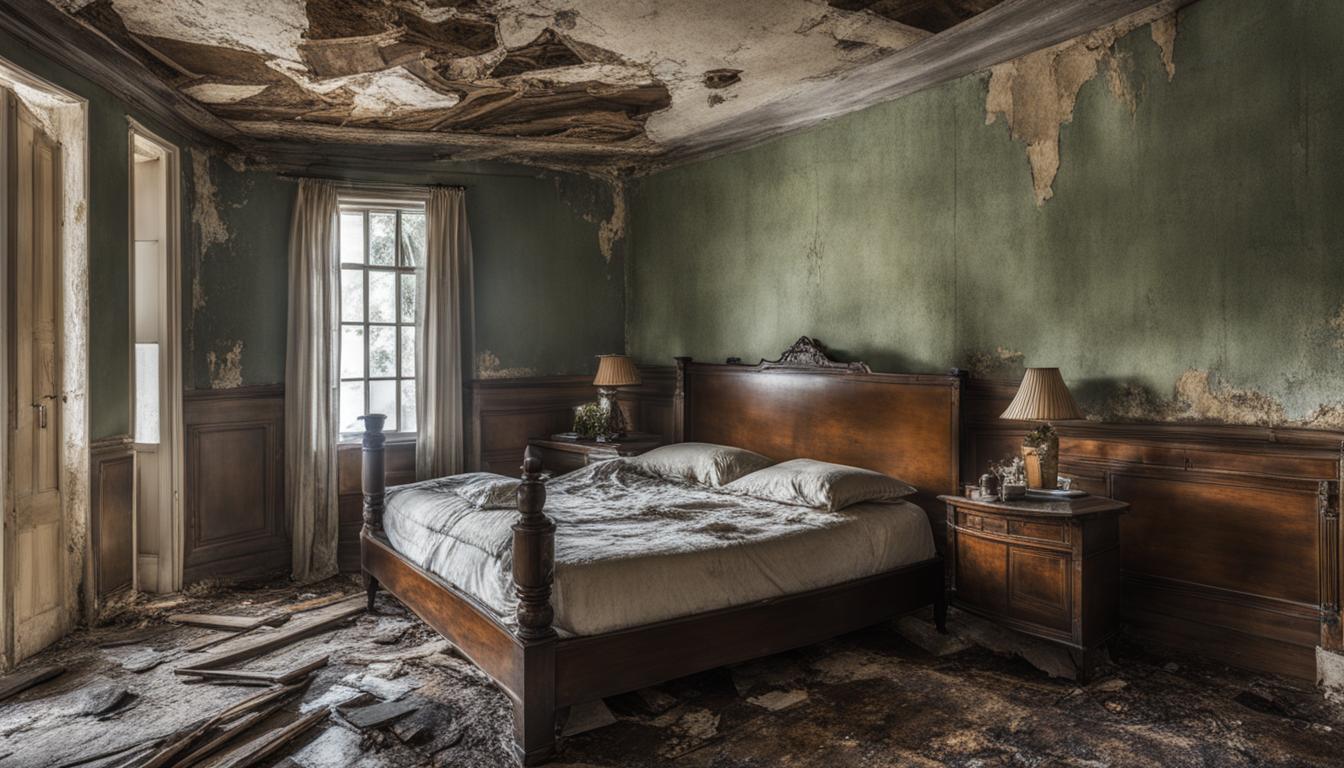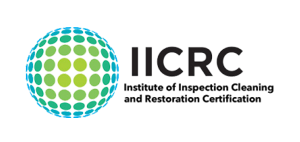If your home has recently suffered water damage, you may be wondering whether it’s safe to sleep there. Unfortunately, the answer is not a simple one. Water damage can pose serious health risks that can impact you and your family’s well-being in the long term.
In this section, we will explore the safety concerns associated with sleeping in a house that has water damage. We will examine the risks involved and provide insights on how to ensure your health isn’t compromised in your own home.
Key Takeaways:
- Water damage can pose serious health risks
- Risks include respiratory problems and allergies
- It is crucial to prioritize your safety and take appropriate measures to remediate the issue
- Hiring professionals and proper remediation techniques can help ensure your safety
- Promptly addressing water damage can create a safe living environment for you and your family
Understanding the Risks of Water Damaged Homes
If your home has recently experienced water damage, it’s crucial to be aware of the potential health hazards that can arise. Mold growth, structural damage, and electrical hazards are just a few of the risks associated with water damage and can pose a serious threat to your well-being.
One of the most significant concerns associated with water damage is mold growth. When left untreated, mold can accumulate and spread throughout the home, leading to respiratory problems, skin irritation, and allergic reactions. Inhaling mold spores can trigger asthma attacks and exacerbate other lung conditions, making it crucial to address water damage promptly.
Structural damage is another potential risk of water damage that can compromise the safety of your home. Water can weaken building materials such as wood and drywall, causing them to warp or rot. In severe cases, the structural integrity of the building may be compromised, putting the occupants at risk.
In addition to mold growth and structural damage, water damage can also create electrical hazards. If water comes into contact with electrical outlets or appliances, it can cause short circuits or fire. This can lead to injuries, such as burns or electrocution, making it essential to turn off the power immediately if you suspect water damage in your home.
It’s important to be aware of the risks associated with water damage and take the necessary steps to mitigate them. Hiring a professional to assess the extent of the damage and provide guidance on remediation techniques can help minimize the risks and ensure your safety.
Health Effects of Sleeping in a Water Damaged Home
Sleeping in a water damaged home can have serious health effects on you and your family. Exposure to mold and other contaminants can cause respiratory problems, allergies, and other physical symptoms.
Mold grows in damp, warm environments, making it a common problem in water damaged homes. When spores from mold are inhaled, they can cause respiratory issues such as wheezing, coughing, and shortness of breath. Allergies can also manifest, causing symptoms such as sneezing, runny nose, and itchy eyes.
Other contaminants that may be present in water damaged homes include bacteria and viruses, which can cause infections and other health issues. For example, standing water can attract mosquitoes, increasing the risk of mosquito-borne illnesses like West Nile virus.
It’s crucial to address water damage promptly and thoroughly to avoid these health risks. Call in a professional to assess the extent of the damage and determine the most effective remediation strategies. This will help create a safe and healthy living environment for you and your loved ones.
Steps to Ensure Safety and Remediation
When dealing with water damage in your home, ensuring safety and implementing proper remediation techniques should be top priorities to prevent potential health hazards.
The first step in addressing water damage is to hire a professional remediation service to assess the extent of the damage and develop a plan for restoration. These professionals have the expertise and equipment necessary to identify the source of the damage, address any safety hazards, and effectively remediate the affected areas of your home.
Next, once the cause of the damage has been identified and addressed, it’s important to properly dry out any affected areas to prevent the growth of mold or other contaminants. This may require the use of specialized equipment such as dehumidifiers or fans to remove excess moisture.
If mold is present, it’s essential to take proper precautions to prevent exposure and spread of spores. This may include sealing off affected areas, using protective gear such as gloves and face masks, and properly ventilating the space during remediation.
Finally, it’s important to thoroughly clean and sanitize any affected areas to ensure the safety and health of you and your family. This may include using specialized cleaning products or hiring professionals to effectively remove any remaining contaminants.
By following these important steps, you can ensure the safety of your home and family while effectively addressing water damage and its potential health hazards.
Conclusion
After exploring the various risks associated with water damage in your home, it is clear that sleeping in a water damaged house can have serious health consequences. From mold growth to structural damage, there are many hazards that can compromise your well-being.
However, by taking the appropriate steps to ensure your safety and remediate the issue, you can create a safe living environment for yourself and your family. This includes hiring professionals to assess the extent of the damage and implement proper remediation techniques. By doing so, you can enjoy peace of mind knowing that your home is free from the risks of water damage and safe to sleep in.
Remember, the health effects of sleeping in a water damaged home should not be taken lightly. Whether you have experienced water damage recently or suspect it may be an issue in your home, it is crucial to prioritize your safety and take action promptly.
FAQ
Is it safe to sleep in a water damaged home?
Sleeping in a water damaged home can pose risks to your health and safety. It is important to address the water damage promptly and thoroughly to minimize potential hazards.
What are the risks of water damaged homes?
Water damaged homes can present various risks, including mold growth, structural damage, and electrical hazards. These risks can compromise the integrity of the house and pose health hazards to occupants.
What are the health effects of sleeping in a water damaged home?
Sleeping in a water damaged home can lead to respiratory problems, allergies, and other physical symptoms. Exposure to mold and other contaminants can trigger these health effects.
What steps can I take to ensure safety and remediation?
To ensure safety and address water damage, it is recommended to hire professionals who specialize in water damage restoration. Assessing the extent of the damage and implementing proper remediation techniques are crucial in creating a safe living environment.
What is the conclusion regarding sleeping in a water damaged home?
In conclusion, while the severity of the risks may vary, it is essential to prioritize safety and take appropriate measures to remediate water damage. Prompt and thorough actions can help create a safe living environment for yourself and your family.







